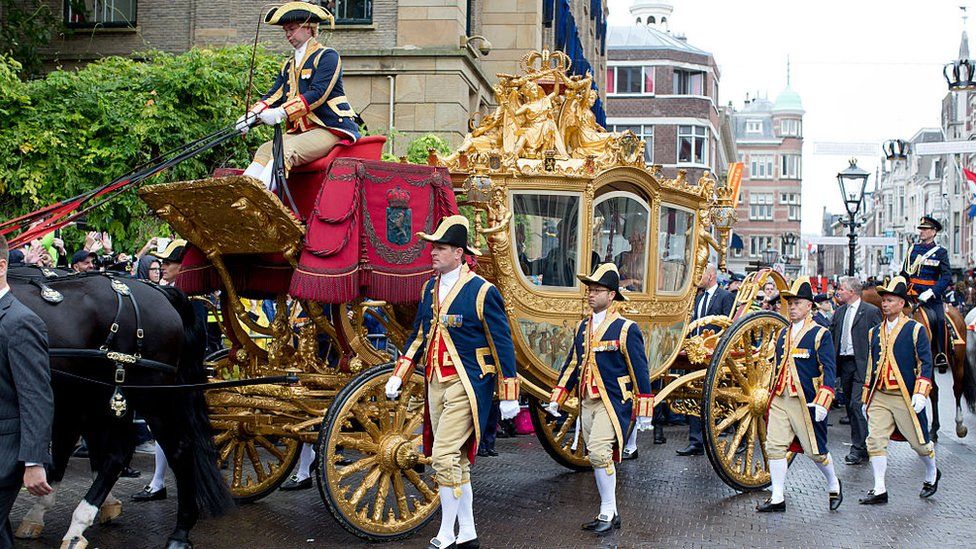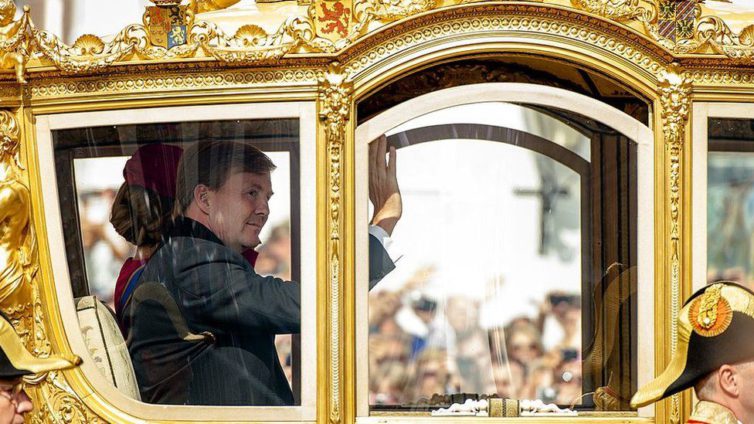The Netherlands' King Willem-Alexander has announced that Dutch royals will cease using a historic golden carriage amid a debate over slavery links.
Critics say that one side of the horse-drawn carriage, called De Gouden Koets, is decorated with an image that glorifies the country's colonial past.
Out of use since 2015, the carriage has traditionally been used to carry Dutch monarchs to the opening of parliament.
The move comes amid an ongoing debate in the country over its history.
The controversial image featured on the vehicle is called Tribute from the Colonies, and depicts black and Asian people - one of whom is kneeling - offering goods including cocoa and sugarcane to a seated young white woman who symbolises the Netherlands.
Seated next to her is a man offering a book to a young boy, which the work's painter, Nicolaas van der Waay, said in 1896 was intended to portray the Netherlands' gift of "civilisation" to its colonies.
In an official video announcing the move, King Willem-Alexander accepted that the carriage was offensive to a large number of people and called on the country to face the legacy of its colonial history together.
"There is no point in condemning and disqualifying what has happened through the lens of our time," he said.
"Simply banning historical objects and symbols is certainly not a solution either. Instead, a concerted effort is needed that goes deeper and takes longer. An effort that unites us instead of divides us.
"As long as there are people living in the Netherlands who feel the pain of discrimination on a daily basis, the past will still cast its shadow over our time," he added.

The carriage has been out of use for several years and has resided at the Amsterdam Museum since a lengthy restoration project concluded last year.
Anti-racism campaigners in the Netherlands have welcomed the move, but have called on the king to take further action to face up to the legacy of colonialism.
"He says the past should not be looked at from the perspective and values of the present," said Mitchell Esajas, co-founder of The Black Archives in Amsterdam.
"I think that's a fallacy because also in the historical context slavery can be seen as a crime against humanity and a violent system."
In recent years, many Dutch people have been urging the country to have a reckoning with its colonial past.
During the 17th Century the Netherlands conquered large swathes of territory in regions now known as Indonesia, South Africa, Curaçao and New Guinea, where it became a key player in the transatlantic slave trade.
Last year, the mayor of Amsterdam, Femke Halsema, formally apologised for the city's role in the slave trade.
The move put her at odds with Prime Minister Mark Rutte, who has rejected calls for a formal state apology.
Latest Stories
-
JoyNews reporter attacked by NPP members during Wontumi’s EOCO detention coverage
6 minutes -
Security tightened at EOCO as tension mounts over Wontumi’s arrest
7 minutes -
AG files motion to strike out suspended CJ’s supplementary affidavit
22 minutes -
Lamine Yamal signs 6-year extension at Barcelona
26 minutes -
NPP supporters attack police pickup trucks at EOCO’s head office
29 minutes -
Wontumi’s arrest by EOCO likely linked to suspected money laundering – Kpebu
1 hour -
A/R: Fire destroys several apartments at Bomso
1 hour -
Scores of NPP supporters storm EOCO office over Wontumi’s arrest
1 hour -
Consumer Protection Agency commends FDA for crackdown on dangerous fake diapers
2 hours -
Two jailed 14 years for defilement in disturbing ‘money charm’ case
2 hours -
AI & Automation – The secret weapons transforming customer experience in Ghana
2 hours -
CJ’s removal saga: This is ‘alien to justice’ – Dame criticises ongoing proceedings
2 hours -
Exhibit your christian values at work to support Ghana’s development – Dean of St. Cyprian Anglican
2 hours -
Support cedi gains with strong domestic production – IEA
2 hours -
Rambo-style arrest of people unnecessary – NPP on Wontumi’s arrest by EOCO
2 hours

